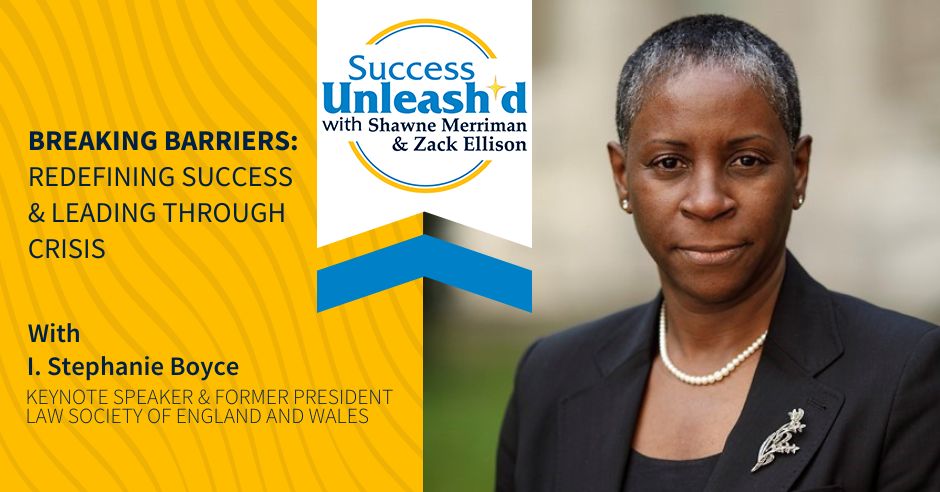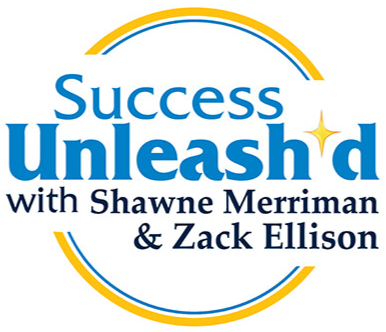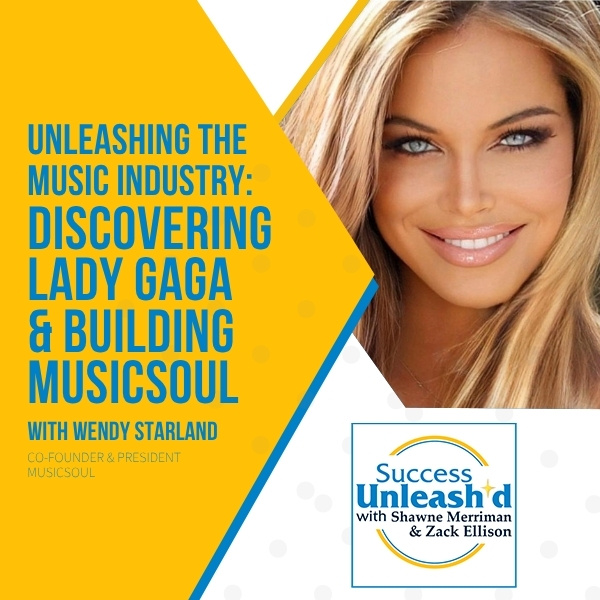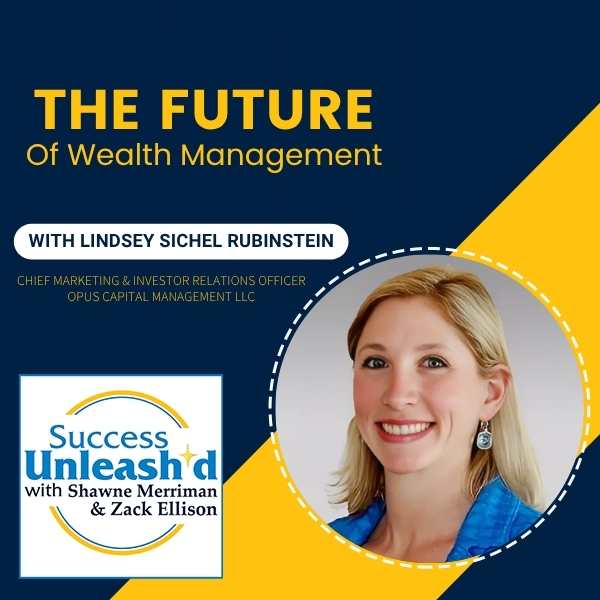
Ever wondered what it takes to shatter centuries of tradition and lead through global upheaval? In this powerful conversation on Success Unleash’d, leadership takes center stage as I. Stephanie Boyce, former president of the Law Society of England and Wales, joins hosts Zack Ellison and Shawne Merriman to share her remarkable journey—from a childhood shaped by injustice and her family’s Windrush legacy to becoming the first Black president and sixth woman in the Society’s 177-year history. Discover how she led through unprecedented crises and stayed fiercely committed to a diverse and inclusive legal profession. This is a story of courage, conviction, and the power of speaking up to ignite profound change.
Success Unleash’d Principles From This Episode
1. Define Your Vision and Stay Committed
A clear and impactful vision is your unwavering guide. It provides direction and purpose, ensuring your efforts consistently move you toward your ultimate goals, even when faced with challenges.
2. Embrace Transformative Leadership
Go beyond simply following established norms. Actively redefine leadership by taking initiative, driving measurable change, and uniting others to solve collective problems. Don’t wait for permission to innovate.
3. Cultivate Resilience in the Face of Adversity
Develop the ability to overcome significant obstacles. Resilience is crucial for navigating crises and unexpected challenges, allowing you to adapt and persevere even when thrown into difficult, uncharted territory.
4. Harness Counter-Intuitive Determination
When others express doubt, let it fuel your resolve. Often, the more people say something can’t be done, the stronger your determination should become, pushing you to achieve what seems impossible.
5. Redefine Success Beyond Traditional Metrics
Move past definitions of success solely based on titles, wealth, or accolades. True success lies in the impact you have on others and the meaningful difference you make in the world.
6. Discern Genuine Relationships
As you gain prominence, be aware that the nature of your relationships may shift. Learn to distinguish authentic connections from those driven by position or status. Authenticity in your circle is paramount.
7. Uphold Your Conscience
Even when facing public scrutiny or potential personal cost, prioritize your integrity. Maintaining a clear conscience means acting in alignment with your values, ensuring you can stand by your decisions.
8. Use Your Voice for Broader Service
Leverage your platform not to diminish others, but to empower and lift them up. Believe in a life of service, using your influence for the betterment of society, even when it demands courage.
9. Cultivate Self-Worth and Avoid Comparison
Build a strong sense of self-worth and resist the urge to compare your journey to others. Comparison can be “the thief of all joy”; recognizing your own value is fundamental to sustained effort and personal growth.
10. Embrace Relentless Perseverance
Understand that success often requires multiple attempts and significant effort. Perseverance is key to overcoming obstacles and opening doors. Believe in your dream and keep pushing forward, no matter how many setbacks you face.
—
Watch the Episode Here
Listen to the Podcast Here
Breaking Barriers: Redefining Success & Leading Through Crisis With I. Stephanie Boyce
We have with us I. Stephanie Boyce who is the Former President of the Law Society of England and Wales. Pretty big deal, Stephanie.
Certainly to me.
Thanks so much for joining and I appreciate you taking the time on your evening in the UK.
A Friday evening at that. Yeah.
You’ve done so much in your career. Tell us what you’re doing now, but also all the things that got you here.

Defining Career Vision & Purpose
Absolutely. I am the Company Director of my own advisory consulting business, Stephanie Boyce Consulting Limited. I advise not-for-profits, organizations, management, governance, training, retreats, and whatever they want me to do. My primary focus at the moment is actually keynote speaking. Lots of people, years after I left office in October 2022, still want to hear what I’ve got to say. In fact, I was on one of the major channels talking about whether it’s okay for you to take the law into your own hands. I remain committed to my vision, ultimately, which remains to create a more diverse and inclusive profession, and certainly, one that’s more reflective of the society that we are seeking to serve.
How did you get here? Tell us how you got started in this whole journey.
Early Life & Motivation For Justice
How did I get started? I think my story starts with my grandfather in 1960. He leaves the Caribbean, the sunny isles of St. Vincent and the Grenadines in the Caribbean. He comes here. I think it’s fair to say that he came in 1960. My nan came in 1962 and they came 2 by 2 by 2, until in 1967, my mother came. My mother’s a twin. She comes with her twin and her other sister and they come here. My father, obviously, they didn’t know each other at this time, but he came in 1964 from Barbados, part of the Windrush generation as it’s known in the United Kingdom and within the Commonwealth. I think it’s fair to say that they came in such faith, hope and greater opportunity in such upward mobility.
My grandfather, bless him, was illiterate, but he told us we were to make something of ourselves. He didn’t say what, but we were to make something of ourselves. I hope I’ve done him absolutely proud. For me it was growing up with the sounds of injustice ringing in my ears domestically and globally. I can see what was going on around the world in the United Kingdom. I wanted to make a difference to have my voice heard and indeed amplify people’s voices who felt that their voice weren’t being heard. That started very young for me, around about the age of seven.
When you started that, that takes a lot of courage. I’m sure you got a ton of pushback. I’m sure a lot of people maybe even try to talk you out of it because, let’s be honest, there’s, there’s some dangerous right to come with being that outspoken. What kept you going forward no matter what? I’m almost sure, and I don’t know the specific situations of people that said, “Maybe you shouldn’t do this. Maybe you should be a little less outspoken.” What kept you on that same path and that vision?
It’s an interesting question because it’s a question I’ve been asked time and time again. I think some of this comes from my paternal grandmother, who had a mind of her own. I think for me, the more that people told me I couldn’t, the more I was determined that I could. Coming from a single-parent household, because my parents would split when I was age four, growing up on a council estate with social housing, not the projects, but almost like the projects, growing up there, I was always dreaming big.
The more people told me I couldn’t, the more determined I was that I could. Share on XI was around about age seven and we would get our first female prime minister. She was our first female prime minister. Before that, she was the education minister, but she was a barrister, so a lawyer, because we’re not a fused profession in England and Wales. Solicitors and barristers collectively were lawyers. Seeing her and dreaming big and throughout my whole life, some of the best lessons have come with a sting in the tail in as much as when people told me, and I’ve never been one for taking advice and even to this day, which probably is to my detriment, but looking beyond and dreaming big and being bold enough to stick my head above the parapet.
Stephanie, I feel like you have so much to share because you’ve really been successful in ways that others haven’t been. You’re really like a trendsetter. A trailblazer is the better word. I’m very curious how you decided to use influence in the legal profession to influence change.
In 2019, I was elected as deputy vice president. It’s an automatic trajectory that once you become deputy vice president, you will become vice president and then president, as I did in March 2021. When I turned up at the Law Society as deputy vice president and said, “I’m here, what do you want me to do?” It was like, “Go away and come back when you are president.” I was like, “Huh?” I knew this was going to be big. I knew that I was the first black office holder to be elected in 2021 and I was due to become, in October 2021, the first person of color, the first Black president, the 107th president, the 6th female and so forth.
The world was changing. In between me becoming deputy vice president, we had a pandemic, a global pandemic. As I started to ascend from deputy vice president, we had, of course, the global movement that would be sparked by the death of George Floyd. As the press came forward and wanted to speak to Stephanie Boyce about institutional racism in the legal profession, I said, “I’m not interested in speaking about my experience of institutional racism in the profession. What I’m interested in is I’m interested that when I leave office, I want to see change, markable change, measurable change.”
I founded an initiative called ACT, Achieving Change Together. I brought other branches of the legal profession together and I said, “We have a problem. We have an issue, and together, we’re going to solve it.” I think it’s fair to say that I was transformative, redefined leadership, what it looks like, how it could be done. As I say, the more people told me, this is not the way we do things. The Brits love tradition and precedent, and the more they told me, “This is the way we’ve always done things,” the more I was determined to make my time count.
Being a professional athlete, I always talked to people a lot about pressure. The pressure to perform, pressure to be in tough situations and everyone can’t deal with it. A couple of the historic events you just talked about, like the pandemic, the world shut down. George Floyd. I feel like the world shut down. It was pretty wild here in the States, but it was protests and marching. It was a worldwide, what pressure came with those historic events and now you’re thrown in the fire at that time.
We were probably one of the countries in the world that was locked down. We were quite restricted and locked down for the longest, I think probably a total of a couple of years. Our courts got shut down, the conveyance in market, the real estate market got shut down, but we had to keep the wheels of justice turn in. We had the courts coming to us and saying, “Can you get your firms to give us hand sanitizer?” I was sat next to a chap at dinner who runs a brewery company. He was saying that they had to pivot because nobody was drinking alcohol. They won’t go into the pub to drink the alcohol. There were plenty of people drinking alcohol, they just weren’t able to go out. What he said was they had to quickly pivot and start producing hand sanitizer.
What we had to do was, because people were coming to us seven days a week, I was deputy vice president at that point, but 7 days a week, almost 24 hours a day, sat in the comfort of your home, having to be leaders, show leadership and calm nerves. We had people driving from town to town, queueing outside of electronic companies because the infrastructure wasn’t there within their companies, their firms. They hadn’t invested in technology. The pandemic did, in 48 hours, technology and so forth, what would’ve taken the legal profession, the solicitor profession, 10 years to adopt. Of course now, we’re racing ahead and it’s becoming disruptive, AI and the likes of that technology.
I hope they had cameras following you around and you had some media going, because that sound like a Netflix documentary. To be thrown in a fire that way because, again, when historic events happen like that, there’s no script, there’s no roadmap. It’s almost like you’re trying to navigate through stuff that there’s no book on. There’s no manual.
Leading During Turbulent Times & Unforeseen Challenges
Absolutely. Let me put it into context. By the time I became president, we were also exiting the European Union. I’m coming to it at the tail end of Brexit, a pandemic. We had the war in Ukraine, we had the withdrawal in Afghanistan and the death of Her Majesty the Queen. I was out in Delhi when Her Majesty passed. Being recalled back to the UK to lead the profession in mourning, all of those things. I led the profession during one of the most turbulent times in the nation’s history. To put that into context, this is somebody who’s come from a background where there was no handover for me to become president.
As I mentioned earlier, I was due to become president in October 2021. Before the pandemic, I had planned it all. I was going to throw the biggest party, throw open the doors of Chancery Lane, which is the headquarters of the Law Society, and invite everybody in, blast out Bob Marley everywhere, have Caribbean food and just bring a bit of culture to that place. However, the pandemic struck, and also, the previous president then found himself having to step down earlier.
With less than two weeks’ notice, stuck in my home because we weren’t allowed to go out, I was becoming president. Having to go into some of these proverbial rooms and exert your authority on behalf of your profession, and indeed, the wider public with ministers, with government and so forth, yeah, looking back, I had to grow up fast.
What were some of the lessons that you learned that you could tell others that they could apply most easily, like some of the low hanging fruit in a sense for best practices?
Take deep breaths. I’m stronger than I realized. Some of the stories that we heard in terms of what was going on when the withdrawal in Afghanistan was taking place. Some of the people who tried to contact us from the legal profession in Afghanistan asking for help, some of that information will live with me for the rest of my days. I practice lots of mindfulness and it’s okay because lots of people will say it’s lonely at the top.
I remember when I was going to office, somebody said, “It’s lonely at the top.” I thought, “What are they talking about?” During all of those episodes, as I say, there was information that was passed that was confidential, embargoed, you can’t discuss it with anyone. I took that literally, that I couldn’t discuss it with anyone. Those were the days that I felt lonely. After office, equally, some of the other lessons I learned is that people who were with me during office were not necessarily for me. The people who were for me are still with me. Lots of hangers-on in terms of if you’ve got a title, if you’ve got a position, they’re interested. That was a difficult story, but resilience permeates through my life story.
You said something about when you have a title, when you’re in a position, and the first thing I start thinking about is being an athlete, a professional athlete and now you got a title, you got people, you’re known, you’re in this position and you really got to be careful of your circle of people around you. You might have people around you that are, like you said, not for you. For me, it was like addition by subtraction. I got better when people started leaving or I got better when you started to get away from those types of people. What process did you go through to start to making those decisions?
Some of it I had to come to unexpectedly and very quickly. If I may, when Madonna did an interview, s and forgive me, Madonna, because I’m not quoting her verbatimly, but she talked about, people often talk about how fame changes you, but they never talk about the fact that fame changes the people around you. I had lots of that and I still have lots of that. That’s been a tough lesson.
The Boris Johnson government. Boris Johnson obviously was our prime minister at the time during the pandemic and after and so forth. His government literally collapsed, but before his government collapsed, I very publicly called him out. The video that I did went viral in places around the world I’d never even heard of. Somebody asked me, did I regret doing that? I sit here with no position, with no title, no honor from the king yet, but do I think perhaps that has played into the fact that I don’t have that?
I answered it and my answer remains the same. In the still of the night, when I’m lying alone in bed, whatever, it’s me, myself, and I, and my conscience, and I can still go to bed, fall asleep with a clear conscience. Yes, okay, maybe I shouldn’t stick my head above the parapet as many times. Maybe if I just be quiet as somebody told me, “Stephanie, you don’t always have to speak up,” but my whole foundation has been built on speaking up. We only have one shot at this life and not speaking up in a way that takes away from other people, but in a way that lifts other people up. I absolutely believe in a life of service and I believe I’m here to serve and I hope that’s what I’m doing.
My whole foundation has been built on speaking up. We only have one shot at this life. We should speak up not in a way that takes from others, but in a way that lifts them up. Share on XSo many people that we talked to, and I don’t care what industry it in and what they do, when you say the people change around you, that was one of the biggest things I’ve been the same since I was a kid. I was a star athlete as a kid. I was a star athlete in high school, a star athlete in college, a star athlete in the pros. You’re the same, but people start to view you different. It is not you that changed. It’s them. I hear, “You think you’re big time now,” or, “You’re acting brand new.”
I’m like, “No, I act the same way at 13 years old when I was also an all-star at 13. I was acting the same way at sixteen when I was also an all-star in high school, an all-star in college. I’ve been the same way all the way through. Now you, on the other hand, may look at me differently or you may act differently around me or perceive me in a different way, but it’s the people around you.” Very few people can say that. You have to be in a prominent position to understand and see that because most normal people don’t get a chance to experience the change that goes on around you.
That’s exactly it. That has been one of the difficult lessons because friends and family members who I thought were by my side forever and a day, that hasn’t been the case. That’s been difficult. As you said and as I was saying to someone, every piece of advice somebody will give you, you’ve got to take it with a pinch of salt because it’s not always for you. It’s not always meant for your good. There’s been lots of those lessons.
Ultimately for me, it is about change and it was about being a visible role model. Some of that has come with security issues. I remain on a number of police lists and anonymously on the electoral role and stuff like that so people can’t identify, hopefully, where I live and so forth. None of what could happen in my upbringing would prepare me for stepping into this role. I will always be eternally grateful for this platform, for this voice, and as I say, to use it for the betterment of society.
Has your definition of success changed over the years, when you were younger, thinking about what you wanted to do versus now when you’ve accomplished a lot? I’m always curious about that with people, if the idea of what success is changes.
The Evolving Definition Of Success
Absolutely. Certainly, for me, you grow, you develop. Every day for me is a learning day. Absolutely, because if you’d asked me what success was, a couple of years ago, I would’ve said qualifying as a lawyer. Now, for me, every time I touched someone or somebody writes to me and say, “You don’t know how you’ve inspired me. You don’t know what you’ve inspired me to do or the change I’ve made,” whatever, that is success. Of course, people measure it differently. Some people think the success is by how much money they have in their bank account, how big their home is and so forth. For me, the joy that comes with knowing that actually I have made a difference, that my time in this world is counting.
That sounds right to me. I think that as we get older, at least for me, I can’t speak for others, of course, I think more about the impact that I have on others and less about my personal accomplishments. When I was younger, it was very much about whatever next goal was in front of me. It’s this degree or that degree, or this job or that job, or this amount of money or whatever it might be.
Maybe part of it is once you’ve accomplished those things and look back, you realize they’re really not that that big a deal in the grand scheme of things. It doesn’t mean that much. I mean, it does in a sense because it is the building blocks that get us here. I wouldn’t be where I am now if I hadn’t done all those things. At this stage in my life, I’m much more concerned about broader impact and there’s not much more for me to do individually in terms of credentials or accolades.
I’m not going to turn any down that come my way.
Also, part of it too is I think once you reach a level where you’re comfortable financially, the marginal benefit that you feel from gaining more money is actually very low. There’s been a lot of academic studies on this that show that after a certain level of income, which is usually what I consider a comfortable level of income where all your basic needs are met and you feel comfortable, you’re safe, you can feed your family and kids and got all the basics, after that point, the marginal dollars don’t really actually equate to more happiness. That’s been proven many times. I feel I can see that now and not just with money, but with credentials or with your fame or accolades. It doesn’t really mean that much to me, at least, as I get older.
Absolutely, but it’s also how people perceive you. I was in an interview for a particular role that I was approached to put my name forward for, and they were absolutely fixated on me being privileged. Forget the fact that my background, as I say, that my grandfather was illiterate and my parents left school with no qualifications whatsoever.
Everything that I have achieved has been through hard work and grit. I have pulled myself up by my boots strings. Nobody gave me anything other than advice. To sit there and listen to these people make assumptions about my life, where I am now and who I am, and of course, I acknowledge the privileged position I sit in, but it’s extraordinary, the assumptions that people make about you and try and label you with.
I’ve noticed that a lot. What it really comes down to, they can’t fathom it for themselves. They can’t fathom the discipline. They can’t fathom pushing through on days when they don’t want to get up and do anything. They can’t fathom through fighting through obstacles or any kind of trials and tribulation. They can’t fathom it for themselves.
They can’t even look at you in that way because they can’t see it for themselves. I always looked at it as it’s not even a reflection of you. It’s more of a reflection of them. They can’t imagine them putting themselves through that many things and having to overcome it because they can’t do it or they don’t want to do it. Maybe they could and they just don’t want to do it, or they haven’t done it.
They’re projecting these things on themselves. When someone say that, it just reminds me that I’m very far ahead of where they are. It doesn’t bother me anymore. In fact, it just gives me more validation that they can’t do what I’m doing and they don’t want to do it. They don’t want to sacrifice, they don’t want to have to have discipline. They don’t want to give up certain things in life. I look at everything like that as validation. It’s like, “Thank you for telling me. I appreciate that.”
Absolutely.
It’s crazy. I was the exact same thing. That was going to be my next point. It’s not you, it’s them. Whatever is in their mind doesn’t really matter.
No, absolutely. I really had to have this mentality, especially as president, that what other people thought of me think of me is none of my business, because there were people queuing up to give advice. They leave me alone a bit now, but people absolutely queuing up to give advice and then being quite sullen when you wouldn’t take that advice, but looking back, if nothing else, I did it my way.
Are there mentors that you’ve had along the way that have given you advice that’s been helpful?
I’ve had mentors known and unknown. Now I can call them mentors, but I didn’t know at the time, people who spoke up for me, advocated for me in rooms that I was in and rooms that I wasn’t in. When I left office, people kept saying to me, “Stephanie, what can we do for you?” If they asked me that question now, my answer would be slightly different because I’d tell them exactly, but at the time, what I said was, “Can you speak my name in rooms that I’m not in?”
For me, that is so powerful, that people will continue to speak up on my behalf, speak my name, put me forward for things without realizing. I didn’t have official mentors, but as I say, there were people in my life who have guided me, steered me towards a particular path, and who’ve been honest enough to say if something is not serving me, whether that’s my inner guiding voice, like whatever, if it’s not serving me, then they’re bold enough to tell me, “You need to try something different.”
Stephanie, I wanted to ask you, for younger folks, if you were to give a presentation or something to room of young, hungry people who didn’t have access or religion, and going to have to basically do it themselves, what are some of the practical steps they could take just from day one? I know we touched a little bit on this before, but to me this is so important.
It’s very hard to emulate what you’ve accomplished or what Shawne’s accomplished because you’re special people. Not everybody can just be born with what you have. For those that maybe don’t necessarily have the same set of skills or innate traits that you might have, what advice would you give them in terms of just things they can do to build methodically towards success?
Perseverance & Self-Worth In Achieving Goals
One of the things I would suggest is that they find a positive affirmation. I love affirmations and I’m always telling myself wonderful and beautiful things. People need to embrace themselves and remember who they are. Remember their self-worth, to never give up to put themselves out there and get uncomfortable. I think it was Theodore Roosevelt who said that comparison is the thief of all joy. That is so true.
People need to embrace themselves, remember who they are, recognize their self-worth, never give up, and be willing to put themselves out there and get uncomfortable. Share on XDon’t compare yourself to others because you’ll always fail. It’s not that I want people to be the same as me, but to perhaps use me inasmuch that every door is open if you push. You persevere until something happens. As I say, you never give up. It took me four attempts to successfully become deputy vice president.
When people told me it would never happen, when people told me, “Never in our lifetime will we see an ethnic minority become president. We need someone who can converse with government and you’ll get frustrated with the workings of the building and all sorts,” absolutely, did I get frustrated with the workings of the building. The Law Society is a huge beast to turn around and so forth, but I got there. I absolutely got there because I believed in my own self-worth, my own self-value. Don’t give up. Keep dreaming and birth that dream. You owe it to yourself and you owe it to this world to put your best self forward.
I think we don’t have anything after that. I feel like I just got a pregame speech just now, so I’m ready to go play some football. We appreciate you for coming on and this was great, and I feel a little bit of motivation myself now, too, to get a chance to speak to someone in a different field but very like mindset and thank you too. We appreciate you for coming on.
Thank you for having me.
Thank You, Stephanie.
Important Links
- Zack Ellison on LinkedIn
- Zack Ellison on Instagram
- The 7 in 7 Show with Zack Ellison (podcast)
- Applied Real Intelligence (A.R.I.) website
- Shawne Merriman on LinkedIn
- Shawne Merriman on Instagram
- Lights Out Sports TV website
- Lights Out Xtreme Fighting website
- I. Stephanie Boyce on LinkedIn
- I. Stephanie Boyce website
About I. Stephanie Boyce
 I. Stephanie Boyce was the first person of colour and sixth woman to lead the Law Society of England and Wales as president; she symbolised progress and inspired underrepresented groups. Her emphasis on equity, diversity, and inclusion, coupled with her advocacy for in-house lawyers, highlighted the value of diverse leadership styles. By addressing systemic challenges like social mobility and inequality, she demonstrated that leadership rooted in representation and resilience can drive meaningful change in a traditionally hierarchical profession.
I. Stephanie Boyce was the first person of colour and sixth woman to lead the Law Society of England and Wales as president; she symbolised progress and inspired underrepresented groups. Her emphasis on equity, diversity, and inclusion, coupled with her advocacy for in-house lawyers, highlighted the value of diverse leadership styles. By addressing systemic challenges like social mobility and inequality, she demonstrated that leadership rooted in representation and resilience can drive meaningful change in a traditionally hierarchical profession.
Stephanie’s work has been recognised with a number of awards. In 2020, Stephanie was voted on to the Governance Hot 100 – Board Influencer and made the Power List 100 Most Influential Black People in the UK in 2021, 2022, and 2023, and jointly awarded the 2022 Burberry British Diversity Awards- Inspirational Role Model of the Year. Most recently, following a public ballot, Stephanie is featured in an art exhibition celebrating ‘100 Black Women Who Have Made a Mark’.
Stephanie is the recipient of the King’s College London Distinguished Alumni of the Year award 2022 and was awarded a Lifetime Achievement Award from Women & Diversity in Law for her work on EDI and her contribution to the profession. Stephanie also received the High Sheriff of Buckinghamshire award for her leadership of the legal profession during the COVID-19 pandemic and services to EDI. In 2024, she received a Lifetime Achievement Award from Justice News247 for her contribution to the legal world and the Paris Bar Medal, an award given to those who promote human rights and participate, through their action and life, to strengthen the rule of law by the Ordre des avocats de Paris. Stephanie is also the recipient of the City of Freedom Award by the City of London.





